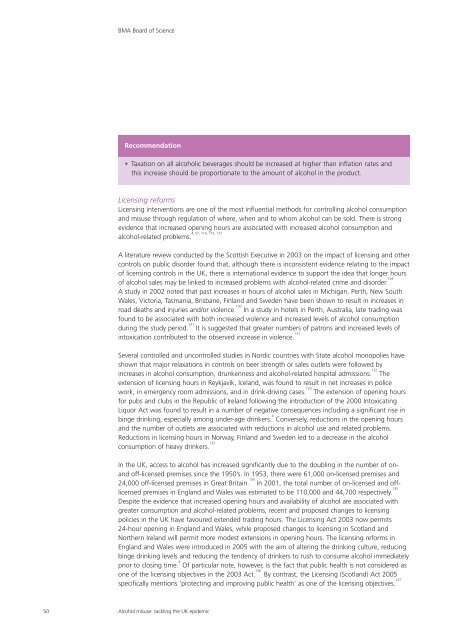Alcohol misuse: tackling the UK epidemic - London
Alcohol misuse: tackling the UK epidemic - London
Alcohol misuse: tackling the UK epidemic - London
Create successful ePaper yourself
Turn your PDF publications into a flip-book with our unique Google optimized e-Paper software.
50<br />
BMA Board of Science<br />
Recommendation<br />
Taxation on all alcoholic beverages should be increased at higher than inflation rates and<br />
this increase should be proportionate to <strong>the</strong> amount of alcohol in <strong>the</strong> product.<br />
Licensing reforms<br />
Licensing interventions are one of <strong>the</strong> most influential methods for controlling alcohol consumption<br />
and <strong>misuse</strong> through regulation of where, when and to whom alcohol can be sold. There is strong<br />
evidence that increased opening hours are associated with increased alcohol consumption and<br />
4, 57, 114, 115, 117<br />
alcohol-related problems.<br />
A literature review conducted by <strong>the</strong> Scottish Executive in 2003 on <strong>the</strong> impact of licensing and o<strong>the</strong>r<br />
controls on public disorder found that, although <strong>the</strong>re is inconsistent evidence relating to <strong>the</strong> impact<br />
of licensing controls in <strong>the</strong> <strong>UK</strong>, <strong>the</strong>re is international evidence to support <strong>the</strong> idea that longer hours<br />
of alcohol sales may be linked to increased problems with alcohol-related crime and disorder. 129<br />
A study in 2002 noted that past increases in hours of alcohol sales in Michigan, Perth, New South<br />
Wales, Victoria, Tasmania, Brisbane, Finland and Sweden have been shown to result in increases in<br />
road deaths and injuries and/or violence. 130<br />
In a study in hotels in Perth, Australia, late trading was<br />
found to be associated with both increased violence and increased levels of alcohol consumption<br />
during <strong>the</strong> study period. 131<br />
It is suggested that greater numbers of patrons and increased levels of<br />
intoxication contributed to <strong>the</strong> observed increase in violence. 131<br />
Several controlled and uncontrolled studies in Nordic countries with State alcohol monopolies have<br />
shown that major relaxations in controls on beer strength or sales outlets were followed by<br />
increases in alcohol consumption, drunkenness and alcohol-related hospital admissions. 132<br />
The<br />
extension of licensing hours in Reykjavik, Iceland, was found to result in net increases in police<br />
work, in emergency room admissions, and in drink-driving cases. 123<br />
The extension of opening hours<br />
for pubs and clubs in <strong>the</strong> Republic of Ireland following <strong>the</strong> introduction of <strong>the</strong> 2000 Intoxicating<br />
Liquor Act was found to result in a number of negative consequences including a significant rise in<br />
binge drinking, especially among under-age drinkers. 4<br />
Conversely, reductions in <strong>the</strong> opening hours<br />
and <strong>the</strong> number of outlets are associated with reductions in alcohol use and related problems.<br />
Reductions in licensing hours in Norway, Finland and Sweden led to a decrease in <strong>the</strong> alcohol<br />
consumption of heavy drinkers. 133<br />
In <strong>the</strong> <strong>UK</strong>, access to alcohol has increased significantly due to <strong>the</strong> doubling in <strong>the</strong> number of onand<br />
off-licensed premises since <strong>the</strong> 1950’s. In 1953, <strong>the</strong>re were 61,000 on-licensed premises and<br />
24,000 off-licensed premises in Great Britain. 134<br />
In 2001, <strong>the</strong> total number of on-licensed and offlicensed<br />
premises in England and Wales was estimated to be 110,000 and 44,700 respectively. 135<br />
Despite <strong>the</strong> evidence that increased opening hours and availability of alcohol are associated with<br />
greater consumption and alcohol-related problems, recent and proposed changes to licensing<br />
policies in <strong>the</strong> <strong>UK</strong> have favoured extended trading hours. The Licensing Act 2003 now permits<br />
24-hour opening in England and Wales, while proposed changes to licensing in Scotland and<br />
Nor<strong>the</strong>rn Ireland will permit more modest extensions in opening hours. The licensing reforms in<br />
England and Wales were introduced in 2005 with <strong>the</strong> aim of altering <strong>the</strong> drinking culture, reducing<br />
binge drinking levels and reducing <strong>the</strong> tendency of drinkers to rush to consume alcohol immediately<br />
prior to closing time. 4<br />
Of particular note, however, is <strong>the</strong> fact that public health is not considered as<br />
one of <strong>the</strong> licensing objectives in <strong>the</strong> 2003 Act. 136<br />
By contrast, <strong>the</strong> Licensing (Scotland) Act 2005<br />
specifically mentions ‘protecting and improving public health’ as one of <strong>the</strong> licensing objectives. 137<br />
<strong>Alcohol</strong> <strong>misuse</strong>: <strong>tackling</strong> <strong>the</strong> <strong>UK</strong> <strong>epidemic</strong>
















